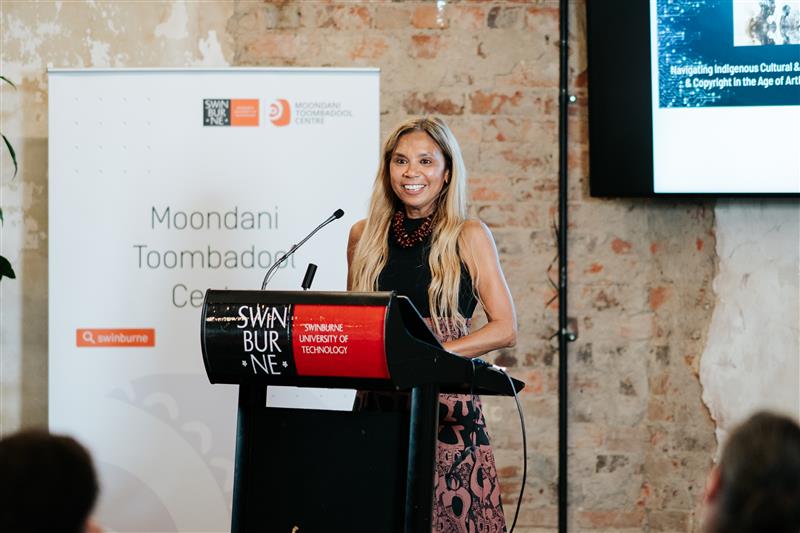Harnessing artificial intelligence to empower Indigenous peoples and cultures

Dr Terri Janke, a Wuthathi, Yadhaigana and Meriam woman, and an international authority on Indigenous cultural and intellectual property gave the 2024 Barak Wonga Oration
In summary
Dr Terri Janke, a Wuthathi, Yadhaigana and Meriam woman, and an international authority on Indigenous cultural and intellectual property, delivered the 2024 Barak Wonga Oration
Hosted by the Moondani Toombadool Centre, the annual address is named after Aboriginal leaders, William Barak and Simon Wonga, and aims to advance understanding of Aboriginal and Torres Strait Islander issues in Australia
The theme of the address was navigating Indigenous cultural and intellectual property and copyright in the age of artificial intelligence
The introduction and rapid evolution of artificial intelligence is transforming industries and reshaping daily life around the world. This evolving landscape offers transformative opportunities but also poses significant risks to Indigenous culture, heritage and rights.
“For Indigenous people, it's not just about the advancement of technology, it's about whether these advancements are respectful and empower our cultures and don’t just turn them into commodities, where they're demeaned or marginalised,” Dr Terri Janke said.
Dr Janke is a proud Wuthathi, Yadhaigana, and Meriam woman and a leading expert on the intersections between Indigenous cultural and intellectual property (ICIP) and artificial intelligence (AI). She is the owner and Solicitor Director of 100 per cent Indigenous-owned legal and consulting firm, Terri Janke and Company.

Dr Janke explained that, while AI can be used in positive ways to contribute to things like language revitalisation, land management, and health innovation, it often operates without the cultural or ethical grounding that Indigenous knowledge systems require.
Many AI tools are developed without Indigenous participation. This perpetuates systemic biases and risks harm through uninformed decision-making, particularly in areas like healthcare, education and the justice system. These biases can deepen existing inequalities and fail to respect cultural protocols or collective custodianship.
“I don't think AI is inherently good or bad… the question is, how will we use it? Will we allow it to deepen the wounds of colonisation, or will we harness it to empower Indigenous peoples and cultures?” Dr Janke asked.
ICIP encompasses a broad system of interconnected knowledge, from traditional ecological practices to stories, languages, and art. Unlike copyright, which focuses on individual authorship, ICIP is communal and tied to cultural heritage and Country. To protect these rights, Dr Janke emphasised the need for Indigenous data sovereignty—control over how Indigenous data is created, stored, shared and used.
Exploring best practice
Dr Janke highlighted the importance of frameworks like the Maiam nayri Wingara Indigenous data sovereignty principles and the True Tracks® framework that she created for best-practice Indigenous engagement. The True Tracks® framework is made up of ten principles. These are respect, self-determination, consent & consultation, interpretation, cultural integrity, secrecy & privacy, attribution, benefit sharing, maintaining Indigenous culture, and recognition & protection.
Looking ahead, Dr Janke calls for leadership and collaboration across all sectors to ensure we can create systems that honour Indigenous knowledge and empower First Nations communities.
“As individuals, we all can play a role and demand transparency from the platforms that we use, support Indigenous led initiatives and advocate for ethical use of AI in the spheres that we influence,” Dr Janke said.
“We can build systems that honour Indigenous knowledge, protect the rights of custodians and make amazing things. AI should not be used to erase culture. It should be used to elevate culture.”
-
Media Enquiries
Related articles
-

- Astronomy
- Technology
- Health
- Science
- University
- Sustainability
- Engineering
Swinburne highly cited researchers reach the top in 12 fields
Ten Swinburne academics have been named on the Highly Cited Researchers 2025 list, released by Clarivate
Tuesday 02 December 2025 -

- University
Over 550 students don caps and gowns to graduate from Children’s University Swinburne
Over 550 students from 34 schools have graduated from Children’s University Swinburne, celebrating over 45,000 hours of learning beyond the classroom this year.
Wednesday 03 December 2025 -

- Technology
- Health
- Science
- University
$1.2m ARC funding to boost national X-ray spectroscopy capability through Swinburne and QUT partnership
Swinburne has secured $1.2 million in the latest Australian Research Council Linkage Infrastructure, Equipment and Facilities scheme round
Tuesday 02 December 2025 -

- University
Swinburne researchers shine at the 2025 Media and External Communications Recognition Awards
Swinburne’s 2025 Media and External Communications Recognition Awards have recognised our academics for notable media and social media outreach.
Thursday 04 December 2025 -

- University
Update on Union Street Windsor
An update from Swinburne University of Technology on the property at 131–133 Union Street, Windsor.
Friday 07 November 2025

